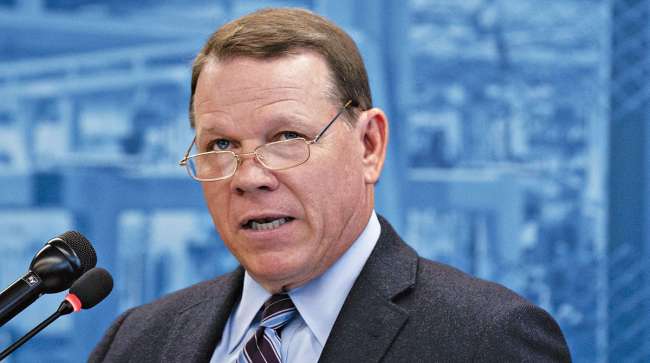Senior Reporter
House GOP Pushes Back on White House NEPA Guidance

[Stay on top of transportation news: Get TTNews in your inbox.]
The top Republican on the U.S. House transportation panel pushed back on the White House’s move to restore provisions of the National Environmental Policy Act.
Rep. Sam Graves (R-Mo.), ranking member on the Transportation and Infrastructure Committee, argued the action from the White House’s Council on Environmental Quality “couldn’t come at a worse time.”
“The nation continues to deal with various crises the president’s policies have exacerbated, from inflation, to the supply chain, to American energy independence,” Graves said in a statement April 19. “Now the administration is moving backwards on much-needed, common-sense NEPA reforms, which will only delay important projects, drive up costs and further erode any value from the [$1 trillion] infrastructure law.”
ICYMI: Today, we finalized a “Phase 1” targeted rule that restores three longstanding provisions to the 2020 NEPA regulations to provide regulatory certainty, reduce conflict, and help ensure that projects get built right the first time. https://t.co/nmpfmi2Fd3 — Council on Environmental Quality (@WHCEQ) April 19, 2022
Graves’ sentiment was echoed by fellow Republicans in the chamber. Congressional GOP leaders have endorsed streamlining the permitting process with regard to infrastructure projects.
“At a time when we should be coalescing around bipartisan ways to lower gas prices, tame skyrocketing inflation and fix the supply chain crisis, President Biden is unfortunately reinstating archaic NEPA regulations that will only result in delays and red tape and feed activist litigation,” said Natural Resources Committee ranking member Rep. Bruce Westerman (R-Ark.).
Last year, Republicans on the transportation panel introduced the Building United States Infrastructure Through Limited Delays and Efficient Reviews (BUILDER) Act that would aim to codify Trump-era environmental provisions. The bill, which awaits consideration, would outline the functions of federal, state, tribal and local agencies in regard to environmental reviews. Specifically, the measure would call for proceeding with environmental scrutiny while seeking to minimize delays.
The White House Council on Environmental Quality recently restored a requirement that federal agencies evaluate relevant environmental impacts with regard to their decision-making, and restored full authority of agencies to develop and analyze approaches meant to minimize environmental and public health costs at the community level.
“This proposed change would give agencies the flexibility to determine the ‘purpose and need’ of a proposed project based on a variety of factors, and to work with project proponents and communities to mitigate or avoid environmental harms by analyzing common sense alternatives,” according to the council. “The 2020 NEPA rule limited federal agencies’ ability to develop and consider alternative designs or approaches that do not fully align with the stated goals of the project’s sponsor, often a private company.”
The move by the White House reverses Trump-era guidance that streamlined NEPA rules.
The policies outlined under NEPA pertain to the authorization and permitting for bridges, rail, energy grid systems and other infrastructure.
“Restoring these basic community safeguards will provide regulatory certainty, reduce conflict and help ensure that projects get built right the first time,” Council on Environmental Quality Chairwoman Brenda Mallory said. “Patching these holes in the environmental review process will help projects get built faster, be more resilient and provide greater benefits.”
Freight stakeholders, such as the American Road and Transportation Builders Association (ARTBA), argued the White House’s guidance could hinder the completion of major transportation construction projects.
ARTBA Objects to CEQ Repeal of NEPA Reforms https://t.co/TGKN6tNuWm pic.twitter.com/oXId5zlAte — ARTBA (@ARTBA) April 21, 2022
ARTBA president and CEO David Bauer said on April 19: “Reinstating outdated regulations that require project sponsors to guess about the indirect impacts of transportation improvements only guarantees that those projects will take too long to deliver.”
“It should never take longer to get federal approval for an infrastructure project than it takes to build the project, but that very well may be the result of the administration’s changes that revert back to the broken 1978 NEPA review process,” Marty Durbin, senior vice president of policy at the U.S. Chamber of Commerce, noted.
During President Donald Trump’s tenure, the NEPA process was updated to reflect the acceleration of certain big-ticket infrastructure projects. Democrats at the time pledged to undo those Trump-era NEPA reforms.
Want more news? Listen to today's daily briefing below or go here for more info:

